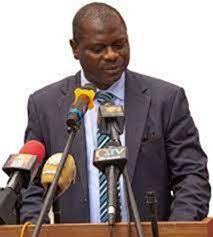Kebba AF Touray
The Minister for Finance and Economic Affairs, Seedy Keita has told the National Assembly that the Gambia government through the support from AfriTac West2 has developed an Asset Management Policy (AMP).
Minister Keita made this revelation while tabling his report on the audited report of 2020 accounts of the government.
Earlier on Friday, 17 November, he responded to audit issues and concerns raised by the Audit on the said government accounts.
On the issue of Asset Management Policy (AMP), he reported: “The Government of the Gambia through support from AfriTac West2, has developed an Asset Management Policy (AMP) for use throughout the government.”
According to Minister Keita, this will to a great extent serve as an important pillar towards migrating to IPSAS accruals, and will also support the management of the tangible and intangible assets of the government.
The financial statements consist of accounts that are under the control of the Accountant General’s Department but do not include full transactions of State-Owned Enterprises, Self-Accounting Projects, and Local Governments.
The Financial Statements comprise the consolidated statements of cash receipts and payments (International Public Sector Accounting Standard -IPSAS), statements of revenue and expenditure – consolidated fund, detailed revenue and expenditure comparison, and accounting policies and explanatory notes.
Reporting to the assembly, the Finance Minister said the entities that have been audited were audited separately by External Auditors, through the Office of the Auditor General.
He said that the financial statements have been prepared in accordance with legal and regulatory frameworks, such as the 1997 Constitution, Public Finance Act, 2014, Financial Regulations 2016, and International Public Sector Accounting Standards (IPSAS Cash Basis).
The adoption of IPSAS, he said, has enabled the government to set appropriate minimum benchmarks for the discharge of accountability and transparency, the provision of a framework against which audit is undertaken.
He added that it has also allowed the government to improve the quality and comparability of financial information reported by the public sector against the performance of other countries that have adopted IPSAS.
Mr Keita explained further that the government has responded to all the concerns and issues raised by the audit, and also reported on the actions taken by the government to remedy the audit concerns.
On the concern on actions taken to remedy them, he said the Government has taken necessary measures to address the issues arising from the audit of the Financial Statements for the year ended 31st December 2020.
He added that details of the actions taken are provided in the Management Letter of the Auditor General, saying, “Additional information/documents and further clarifications on the unresolved issues are being collated and will be shared with the National Audit Office.”
On the audit concern to ensure continuous improvements in the Preparation and Audit of Government Financial Statements, he reported that there has been considerable improvement in the timely preparation and audit of Government Financial Statements in the recent past.
He added, “Government Financial Statements have been prepared up to 2022. The audit of the 2021 Government Financial Statements is currently ongoing, while the preparation of the 2022 Accounts has just been concluded ready for submission to the National Audit Office.”
On the Rwanda IFMIS initiative, he said following the implementation of the IFMIS system that has been in use for almost two decades, the government continues to explore and adopt strategies to ensure its sustainability, as well as reduce the dependency on international consultants.
“In this vein, the Government of the Gambia is collaborating with the Government of Rwanda to come up with a home-grown IFMIS system,” he told the assembly.
On audit issues and concerns on the Treasury Single Account (TSA), the Finance Minister informed the assembly that the implementation of the Treasury Single Account (TSA), through which all Government bank accounts will be consolidated at the Central Bank of the Gambia, has successfully been implemented.
He added that it has been extended to Semi-autonomous institutions such as the National Assembly, Judiciary, National Audit Office, and National Human Rights Commission. This has fully eliminated cash/ Cheque payments.
He said, “The TSA will enhance the Government Cash Position, thereby reducing domestic borrowing. A key tool to support the Treasury Single Account (TSA) is the implementation of a revenue collection platform which is at an advanced stage.”
Subsequently, the audit report on the 2020 accounts of the government has been committed to the Finance and Public Accounts Committee (FPAC) for scrutiny and report its findings back to the plenary for further scrutiny and consideration by the legislature.




















